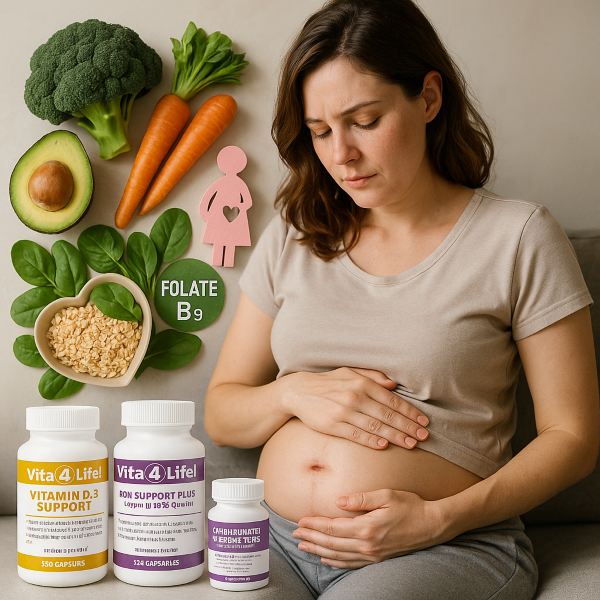
Fertility and Pregnancy Supplementation After Bariatric Surgery
Share
Undergoing bariatric surgery can be a life-changing decision, leading to significant weight loss and improved metabolic health. However, for individuals planning pregnancy after such procedures, careful consideration of timing, nutrition, and supplementation is essential to ensure maternal and fetal well-being.
Nutritional Challenges After Bariatric Surgery
Bariatric procedures such as Roux-en-Y gastric bypass (RYGB) and sleeve gastrectomy significantly alter the gastrointestinal tract, which can impair the absorption of essential nutrients required for fertility and pregnancy. These include folate, iron, calcium, vitamin B12, and fat-soluble vitamins such as A, D, E, and K, which play vital roles in fetal development and maternal health [1; 2].
Post-surgical malabsorption may persist for years, increasing the risk of deficiencies that can lead to complications such as neural tube defects, anemia, preeclampsia, and low birth weight infants [3].
Essential Supplements for Fertility and Pregnancy
To mitigate these risks, supplementation protocols must be customized for individuals who have undergone bariatric surgery. The American Society for Metabolic and Bariatric Surgery (ASMBS) provides guidelines for supplementation before and during pregnancy [2].
Folate (Vitamin B9)
Folate is essential for neural tube development, and deficiency can lead to congenital anomalies such as spina bifida. Bariatric patients are advised to take at least 800–1000 mcg of folic acid daily prior to conception and during early pregnancy, often in combination with other B vitamins for improved absorption [4].
Iron
Iron deficiency anemia is common post-bariatric surgery due to reduced gastric acid and bypassed absorption sites. Iron needs increase during pregnancy to support fetal growth and increased maternal blood volume. Ferrous sulfate or ferrous fumarate supplements providing 45–60 mg elemental iron per day are typically recommended [1].
Vitamin B12
Due to altered intrinsic factor production, B12 absorption is impaired post-RYGB. Deficiency is linked to neurological impairments and fetal growth issues. Monthly intramuscular injections or sublingual B12 supplements (350–1000 mcg/day) are recommended [5].
Calcium and Vitamin D
Both nutrients are essential for fetal skeletal development and maternal bone health. Bariatric patients are at risk of secondary hyperparathyroidism due to impaired calcium absorption. Recommendations include 1200–1500 mg of calcium citrate daily (preferably in divided doses) and 3000 IU of vitamin D3 daily, adjusted based on serum 25(OH)D levels [2].
Additional Nutrients
Other micronutrients requiring close monitoring include zinc, thiamine (B1), vitamin A (monitor closely due to teratogenicity risk), and fat-soluble vitamins. Supplementation should be based on individualised lab assessments [1].
Timing and Preconception Planning
It is generally recommended to delay conception for 12–18 months post-surgery to allow for weight stabilisation, nutritional optimisation, and metabolic adaptation [6]. Attempting pregnancy too soon after surgery can increase the risk of miscarriage, fetal growth restriction, and maternal malnutrition [7].
Preconception evaluation should include:
- Comprehensive micronutrient lab panel
- Medical nutrition therapy
- Multidisciplinary coordination between bariatric, OB-GYN, and nutrition specialists
Risks and Monitoring During Pregnancy
Pregnancy following bariatric surgery is generally safe but requires vigilant monitoring to manage potential complications such as:
- Small-for-gestational-age (SGA) infants
- Intrauterine growth restriction (IUGR)
- Gestational diabetes (lower incidence in post-surgical patients)
- Dumping syndrome and hypoglycemia in RYGB patients [6]
Regular follow-up should include nutritional labs every trimester, growth ultrasounds, and glucose monitoring tailored to surgical type.
Postpartum Considerations
Postpartum, continued supplementation is critical to prevent depletions from breastfeeding demands. Calcium, iron, and B vitamins should be prioritised, and vitamin D levels monitored closely. Weight retention and emotional health should also be addressed, as postnatal depression risks may be elevated in this population [8].
Conclusion
Fertility and pregnancy after bariatric surgery require a proactive, multidisciplinary approach that prioritises nutritional sufficiency and individualised supplementation. With proper planning, monitoring, and support, patients can achieve healthy pregnancies and optimal outcomes for both mother and baby.
Medical Disclaimer: This article is intended for informational purposes only and should not be considered medical advice. Always consult your healthcare provider before making decisions related to pregnancy or supplement use after bariatric surgery.
